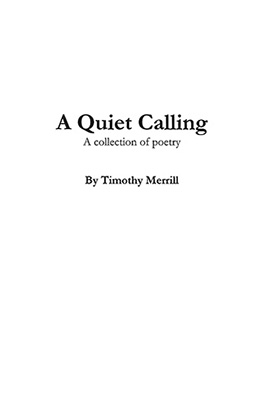A Quiet Calling 
A collection of poetry
Timothy Merrill

This book consists of 78 clear and intimate glimpses into many aspects of Timothy Merrill's life. They range from a 3-line critique of the laws of the solar system to reflections on light, on love, on language and remembering, on cringing at a horse being shod, and on the meanings and doings of God.
With this remarkably diverse collection, Tim Merrill has reaffirmed his right to the mantle of poet.
Timothy Merrill began his writing career at age 19 as a junior newspaper reporter while studying creative writing at The University of British Columbia. In 1979 Caitlin Press published Two Island Poets, which included work by Timothy Merrill and Andy Mathisen. Timothy's first solo book, In Bare Apple Boughs, was published in 1982 by Fiddlehead Poetry Books; Caitlin Press published his Hearts the Same in 1988; and Bravo Press published After the Beginning in 1994. Five more books have followed. Timothy teaches creative writing to mentally disabled students in British Columbia and has spoken in the media about writing and schizophrenia.
Timothy's poetic style is conversational and uniquely understandable. He wrestles with or simply expresses real-life situations, often asking questions about right and wrong, should I or shouldn't I, or simply why. His writing is relatable and unpretentious, and its tone attests to the truth of the book's title.
George McWhirter, Poet Laureate for Vancouver, British Columbia, compared Tim favorably with Thomas Merton, Leonard Cohen, and Margaret Avison, and referred to A Quiet Calling as "Great for a straight-through read or selective revisiting.
"At his best, ... Tim Merrill proves that God is a singular complexity, as is his own life. Through these lyrics, observances, resolutions, derived from human and divine encounters, ... he arrives at a hard-earned simplicity of acceptance. Often in the long slog with God, the heavy experience is taken off their back and his poems, his love and his people 'move all over the planet, lightly, honouring each other's light.' The poems can also linger with the lyrical longing of a good song, listened to in a garden ...."



